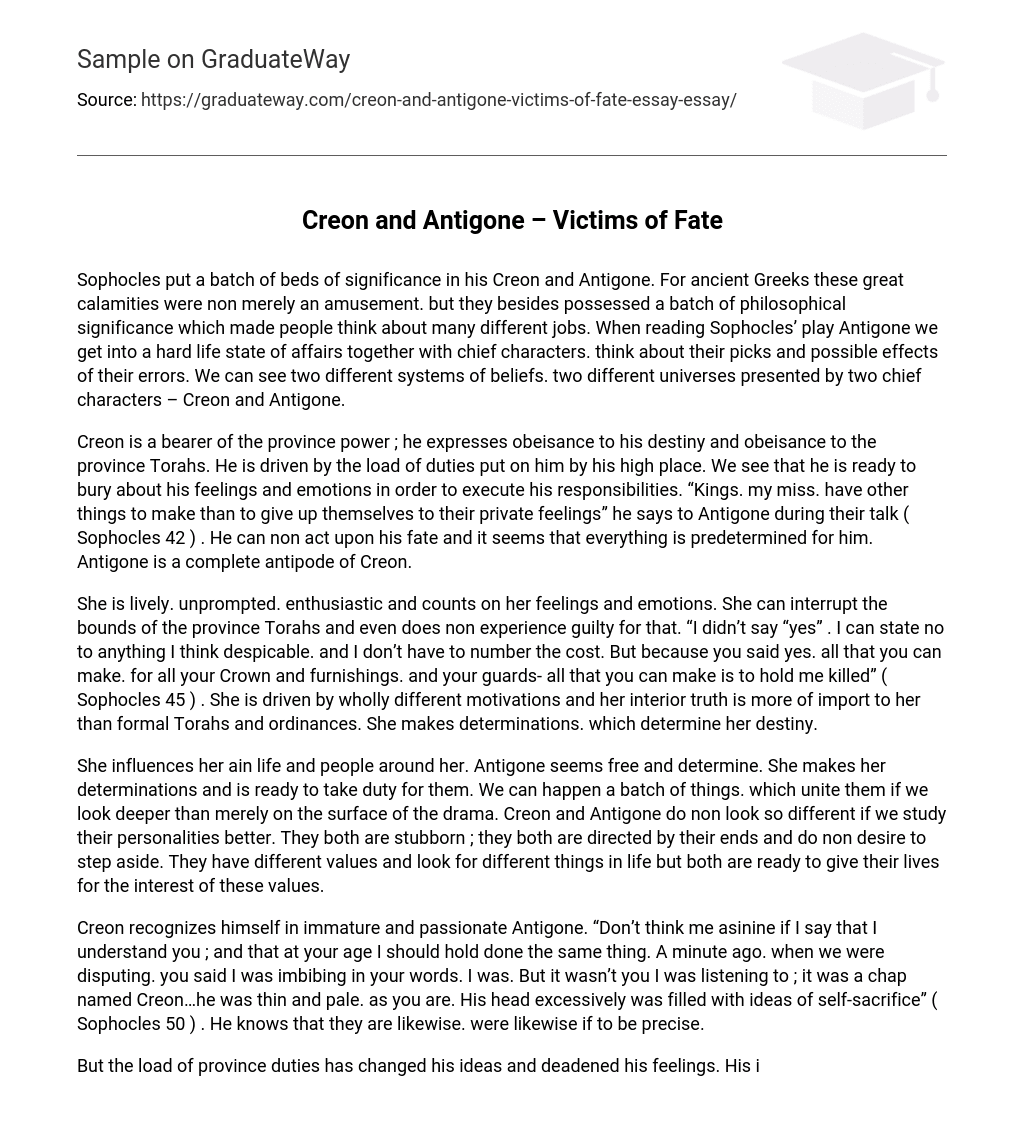Sophocles put a batch of beds of significance in his Creon and Antigone. For ancient Greeks these great calamities were non merely an amusement. but they besides possessed a batch of philosophical significance which made people think about many different jobs. When reading Sophocles’ play Antigone we get into a hard life state of affairs together with chief characters. think about their picks and possible effects of their errors. We can see two different systems of beliefs. two different universes presented by two chief characters – Creon and Antigone.
Creon is a bearer of the province power ; he expresses obeisance to his destiny and obeisance to the province Torahs. He is driven by the load of duties put on him by his high place. We see that he is ready to bury about his feelings and emotions in order to execute his responsibilities. “Kings. my miss. have other things to make than to give up themselves to their private feelings” he says to Antigone during their talk ( Sophocles 42 ) . He can non act upon his fate and it seems that everything is predetermined for him. Antigone is a complete antipode of Creon.
She is lively. unprompted. enthusiastic and counts on her feelings and emotions. She can interrupt the bounds of the province Torahs and even does non experience guilty for that. “I didn’t say “yes” . I can state no to anything I think despicable. and I don’t have to number the cost. But because you said yes. all that you can make. for all your Crown and furnishings. and your guards- all that you can make is to hold me killed” ( Sophocles 45 ) . She is driven by wholly different motivations and her interior truth is more of import to her than formal Torahs and ordinances. She makes determinations. which determine her destiny.
She influences her ain life and people around her. Antigone seems free and determine. She makes her determinations and is ready to take duty for them. We can happen a batch of things. which unite them if we look deeper than merely on the surface of the drama. Creon and Antigone do non look so different if we study their personalities better. They both are stubborn ; they both are directed by their ends and do non desire to step aside. They have different values and look for different things in life but both are ready to give their lives for the interest of these values.
Creon recognizes himself in immature and passionate Antigone. “Don’t think me asinine if I say that I understand you ; and that at your age I should hold done the same thing. A minute ago. when we were disputing. you said I was imbibing in your words. I was. But it wasn’t you I was listening to ; it was a chap named Creon…he was thin and pale. as you are. His head excessively was filled with ideas of self-sacrifice” ( Sophocles 50 ) . He knows that they are likewise. were likewise if to be precise.
But the load of province duties has changed his ideas and deadened his feelings. His ideals were replaced by the obeisance to Torahs and higher power. Like in the most Grecian calamities Creon is dependent on the will of capricious Gods and has small pick. The lone his pick is whether to follow his finish or non. Creon makes his pick and yieldingly follows his destiny. Antigone challenges non merely societal norms. but besides her ain fate and will of Gods. Antigone easy breaks with her darling sister when she refuses to assist her.
She does non forgive her even when Ismene comes to prison and wants to portion Antigone’s guilt. The same thing does Creon. when refuses to listen to the advice of his old and loyal friend Polyneices. Both. Antigone and Creon could give their beloved people and merely bury about them in the battle for their ideals. Both. Creon and Antigone have their ain moral criterions and unrecorded harmonizing to them. Works Cited Sophocles: The Complete Greek Tragedies. Edited by David Grene. 2 vols. Chicago: University of Chicago Press. 1954-57.





